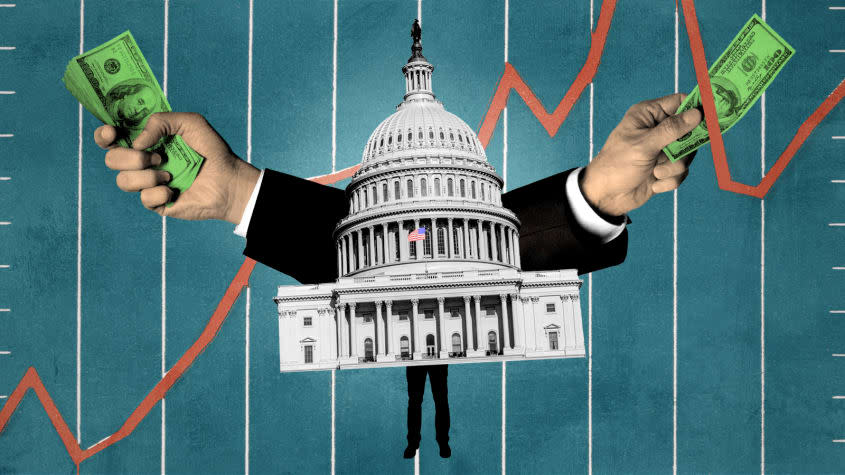The congressional stock trading ban, explained

House Speaker Nancy Pelosi (D-Calif.) hinted on Wednesday that a bill banning members of Congress and their immediate family members from trading individual stocks might finally be up for a vote sometime this month. The bills come after multiple allegations that legislators are financially benefiting from insider knowledge. Here's what you need to know about the movement to limit congressional stock trading:
What are lawmakers asking for in the proposed stock trading bans?
Over the last year, both the House and the Senate have attempted to push forward laws that would tighten the rules concerning stock trading by members of Congress. Public interest in the trading habits of legislators has been under renewed scrutiny recently.
A bipartisan coalition of six representatives collaborated to introduce a bill that would ban Congress members and their families from owning individual securities, stocks, bonds, and commodities in February. The proposed "Bipartisan Ban on Congressional Stock Ownership Act" would still allow legislators to hold mutual funds and EFTs. The suggested penalty for violating the proposed law would be $50,000.
Another proposal, co-sponsored by Rep. Abigail Spanberger (D-Va.) and Rep. Chip Roy (R-Texas), would require legislators to put assets belonging to them and their families in a blind trust while in office, in addition to prohibiting them from trading stocks.
These proposals aim to amend the limited restrictions put on Congress by an existing 2012 law called the STOCK Act. Though Congress created the law to prevent insider trading and force representatives to report their trading activity, Business Insider identified 72 members of Congress who have violated the act. Axios reports that violators include Reps. Susie Lee (D-Nev.), Alan Lowenthal (D-Calif.) and Kevin Hern (R-Okla.); the three representatives are also part of the Top 10 Congress members trading stocks.
How many members of Congress own stocks influenced by their committees?
A recent in-depth analysis completed by The New York Times revealed that at least 97 members of Congress have engaged in buying or selling stock, bonds, and other financial assets that were directly affected by the committees they served on. Some of those transactions were completed by the representative, while others were reportedly the work of their spouse or a dependent child.
Times reporters reached their conclusions by analyzing transactions from 2019 to 2021 from a database of members' financial filings called Capitol Trades. They correlated the trades with related committed assignments, hearing dates, and congressional investigations.
According to the Times report, several legislators defended the trades by stating that a spouse or broker completed them without their knowledge or input. Two of them reported the transactions as accidental.
Who supports a ban on Congress trading stocks?
The sponsors of the proposed bills come from all over the ideological spectrum. In a statement about the trading ban bill submitted in February, sponsor Sen. Elizabeth Warren (D-Mass.) said, "No one should ever have to wonder whether their member of Congress is working for the public interest or their own financial interest." Her co-sponsor, Sen. Steve Daines (R-Mont.), said, "Members shouldn't be able to make legislative decisions or use their platform and influence to benefit themselves personally, which is why it should be no question that owning and trading stocks should be banned."
During an interview with MSNBC, Rep. Spanberger stated that the bill she co-sponsored with Rep. Roy has garnered the support of "more than 67 co-sponsors, Democrats and Republicans, across the ideological spectrum."
As lawmakers anxiously awaited the opportunity to bring the bills to a vote, many of them levied their criticisms of the slow movement of the bills at House Speaker Pelosi. When asked whether Pelosi would bring the bills to a vote before Congress was out of session, Spanberger told MSNBC, "if the speaker wanted to bring it for a vote this week or this month, she certainly could. And so we've seen kind of stall tactics along the way".
Insider reports that 12 ideologically diverse public advocacy groups sent a letter of support for the stock trading bans addressed to Pelosi on Tuesday. The signees, which included conservative group FreedomWorks and progressive group MoveOn, stated that if the bills weren't presented for voting, "a true opportunity will have been lost, and the downward spiral of declining public trust and increasing cynicism will continue."
Though Pelosi does not trade herself, investments made by her husband, venture capitalist Paul Pelosi, recently made headlines. Before Wednesday, Pelosi had not made any announcements concerning the bans, despite expressing support for the bills in February.
What are people against the ban saying?
Lawmakers on either end of the ideological spectrum have vocalized support for imposing restrictions on stock trading. However, a small group of naysayers is speaking out in opposition to the proposed bills. Forbes reports that in response to February's proposal, Sen. Tommy Tuberville (R-Ala.) said, "This is a free country, last time I heard." The Times investigation identified Tuberville as one of the representatives who made trades that constituted a conflict of interest.
According to The Hil, Rep. Elaine Luria (D-Va.) told Punchbowl News she was against the ban "because ... why would you assume that members of Congress are going to be inherently bad or corrupt? We already have the STOCK Act that requires people to report stock trades."
You may also like
Stray kitten inspires company to redesign its packaging for the better
Marjorie Taylor Greene appears to kick activist in confrontation
How an old-school Georgia D.A. could prosecute Trump like a crime boss

